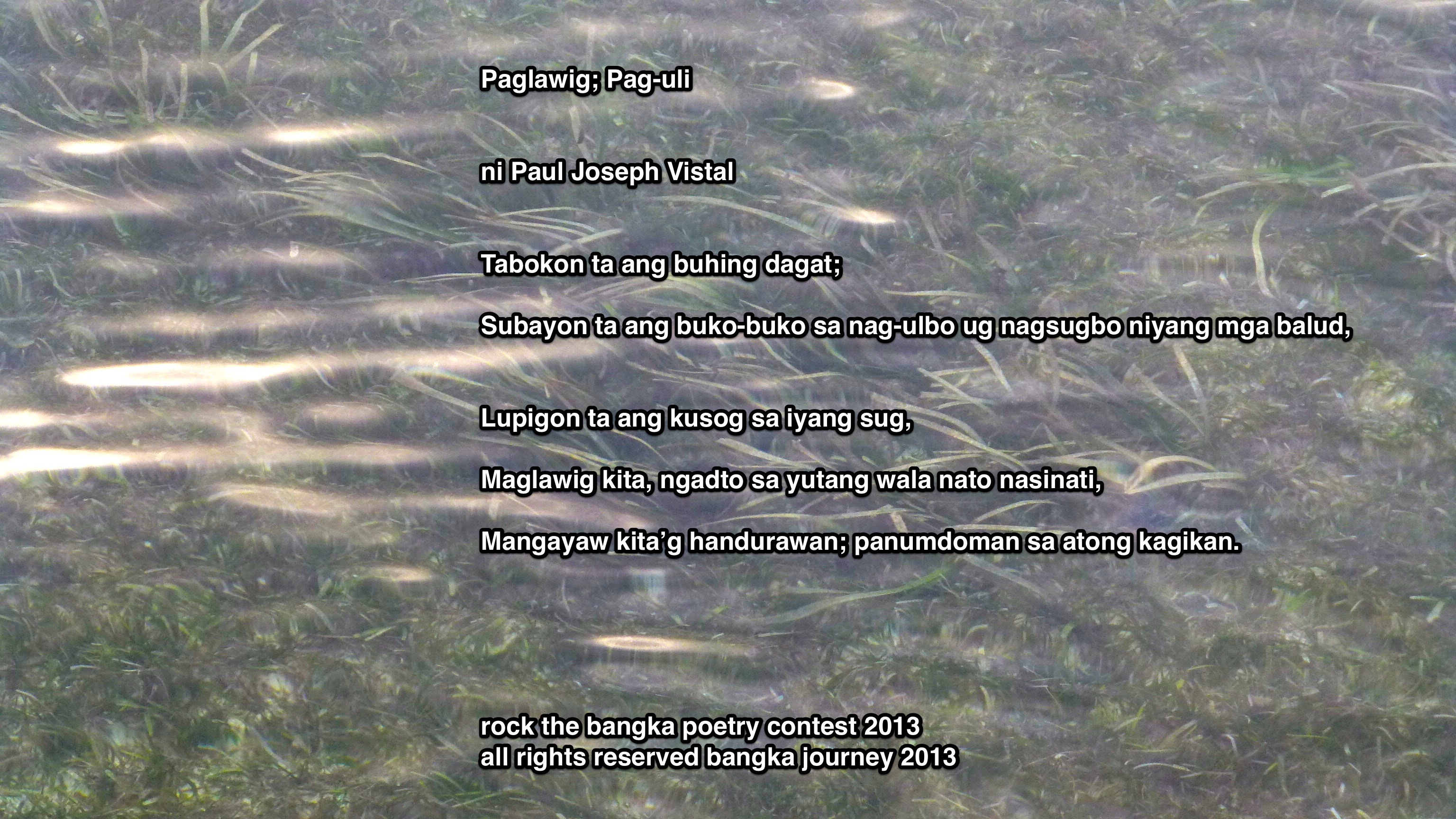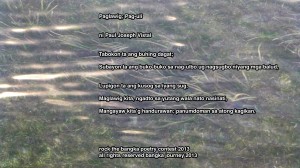i share with you our fb conversation about this poem, scroll down to read his bio:
Paglawig; Pag-uli
Tabokon ta ang buhing dagat;
Subayon ta ang buko-buko sa nag-ulbo ug nagsugbo niyang mga balud,
Lupigon ta ang kusog sa iyang sug,
Maglawig kita, ngadto sa yutang wala nato nasinati,
Mangayaw kita’g handurawan; panumdoman sa atong kagikan.
Hello, Leng.
It’s in Visayan and there may be a couple of words that have negative connotations, but my choice of using them is deliberate and I hope they won’t be taken the wrong way.
Here’s a rough translation. It may not be precise, so I may have to tweak it later. Also a problem is that English doesn’t have genderless personal pronouns, so that in translating “niya” or “siya” I would have to choose to make the reference either male or female and this sort of changes the voice of the poem. In English, it sort of becomes a struggle between genders, where, in the Visayan original, the sea is a living entity who just is and bears no gender.
A Journey; A Returning
We shall cross the living sea;
Keeping to the spine of the rush and rise of her waves,
And with our strength overcome the force of her tides;
We shall journey towards a land we do not know,
We shall seize imagination, gather remembrances of whence we came.
17:02 M Leng Leng : I am in tears how beautiful! (How to express that in bisayan?!) Which of the bisayan words have negative connotation?
“Wa nasinati” in its context in the poem might take on an unfavorable meaning for some Fil-Ams, along with “mangayaw”, which might be interpreted as “to raid or pillage.”
On the first, I chose these words to suggest a feeling of psychological disconnect some Fil-Ams might feel in identifying with a land they are physically far removed from and a culture that they haven’t grown up to. I hope that it would not offend.
On the second, my interpretation is that for some Fil-Ams it is as if they have to take by force a legacy which they have a right to.
06:47 Paul Joseph Vistal “I am in tears” would be “Nakahilak ko.” And “How beautiful!” would be “Pagkatahom.”
biography:
Paul Joseph J. Vistal currently works as a development writer for the provincial government of Bohol, but also does some creative writing on the side. Although he has relatively more experience with creative nonfiction in English, it is for his writings in Sugboanon Binisaya that he feels for most. His creative writing mostly takes the form of poetry, primarily in Sugboanon Binisaya, in a conscious effort to reclaim the literary heritage of his ancestors. He has also begun writing children’s stories, also in Binisaya. He has been told that his metaphors are too obscure, but he insists that people will eventually get them, but it may take more than a while.


Great post. I used to be checking constantly this
blog and I’m impressed! Very helpful information particularly
the closing part 🙂 I maintain such information a lot. I
used to be seeking this particular info for a long time.
Thanks and good luck.
Pingback: Ka (ka) for “pagKAtahom.” | ~~~Balik sa Dagat~Bangka Journey ~~~
hi!this is extremely nice website!
Pingback: all aboard on Pei Qi Xu | Bangka Journey | Bangka Journey
Hello my loved one! I want to say that this article is amazing, nice written and come with almost all vital infos. Iˇ¦d like to peer extra posts like this .
Paglawig; Pag-uli by paul joseph vistal | Bangka Journey | Bangka Journey Frances http://socialmedia4nonprofits.socialgo.com/members/profile/105